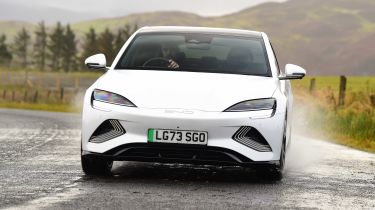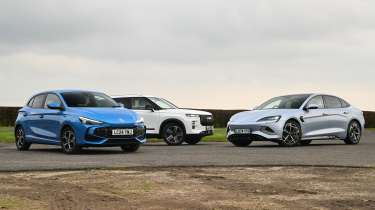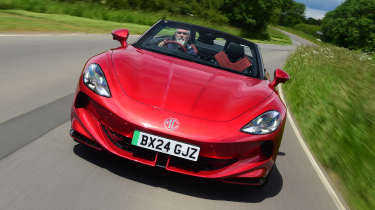Should you buy a Chinese electric car? Prices, quality, reliability and ethics explored
There’s a lot of misinformation out there about Chinese electric cars. We’re here to separate the fact from the fiction

The Internet can feel like the Wild West at times, with misinformation more rife than ever, particularly when it comes to Chinese electric cars. But what’s the real truth, and should you take the plunge and buy one?
That’s what we aim to answer in this special report. We’ve spoken to the brands themselves, as well as industry experts, to address some of the key issues – and dismiss some of the more outlandish rumours and assumptions. Here we answer the burning questions on one of the most discussed topics in the industry.
Why are Chinese EVs so cheap?
Chinese cars have gained a reputation for being cheap, but this isn’t necessarily because they are of poor quality. In fact, there are several factors contributing towards their low price tags.
Firstly, labour costs in China are far below those in central Europe. In August 2023, BYD advertised a job at its Shenzhen factory with a salary of between 5,000–7,000 yuan (£555-£777) per month. But reports show that base salaries in Chinese car makers’ factories can be as low as £260 per month – more than five times less what the average UK worker being paid the minimum wage will earn in the same period.
Secondly, Chinese firms have a big advantage when it comes to sourcing parts and resources. Almost all of the components and materials used in Chinese vehicles are either manufactured or mined in China itself, which greatly reduces costs in terms of transport and import taxes.
Finally, there’s also the widely discussed – and controversial – element of subsidies from Beijing. Many of the Chinese brands we’re all starting to get to know are either owned in part or fully by the Chinese government. The industry is estimated to have received as much as £185billion in subsidies since 2009, helping to keep costs for consumers as low as possible.
To level the playing field, the European Union has recently implemented additional import tariffs of anything from 10 per cent to almost 40 per cent, something firms such as BYD and SAIC are keen to reverse. While the United States has gone further, placing 100 per cent tariffs on Chinese-made electric cars – which would effectively double the price for any car that goes on sale in America – the UK is yet to make any moves on this front. That potentially makes the British market more enticing for China’s car makers.
Can you insure a Chinese EV?
The idea that a brand-new, mass-produced car could be considered ‘uninsurable’ might seem unthinkable, but problems with supply chains and a lack of widespread technical knowledge have thus far made things difficult for owners of some Chinese makes and models.
In 2024, both BYD and GWM Ora came under fire when insurance companies began refusing to cover the former’s Seal saloon and the latter’s Funky Cat (now known as the 03) hatchback. Thatcham Research told Auto Express that while there was nothing inherently wrong with these models, the Chinese manufacturers weren’t providing firms with sufficient access to parts and repair information, which led to vehicles being written off for minor accidents that otherwise could have been repaired easily.

Since then, Chinese car makers have endeavoured to reassure buyers and insurers alike that their vehicles should be no more difficult to insure than the competition. GWM set up its own battery-inspection and repair scheme to ensure cars are not written off needlessly.
Jaecoo told Auto Express that almost all parts for the 7 SUV are available within a 24-hour notice period (or 48 hours in some limited cases). BYD also told us that 90 per cent of parts are now available within 48 hours. That said, while insuring a Chinese car isn’t necessarily impossible any more, there’s no guarantee that it’ll be cheap. Our research has shown that Chinese models consistently have occupied higher insurance groups than their European and South Korean rivals. Of course, owners of electric vehicles are likely to be no strangers to high car insurance costs – Teslas, for example, are notoriously expensive to cover – but it’s still something worth bearing in mind.
Are Chinese cars reliable?
Truth be told, this is a much harder question to answer. It’s difficult to make a sweeping statement regarding the reliability of Chinese EVs, but the indicators are positive. For starters, the majority of manufacturers hailing from China offer lengthy warranties for their vehicles, which gives the impression of having strong confidence in their products. MG cars, for example, come as standard with a seven-year warranty.
If you’re concerned about the validity of such warranties if one of the companies suddenly disappeared from the UK, GWM assured us that it would be upheld by its aftersales department if it ceased trading here, as per what’s happened with Mitsubishi.
This should give buyers some peace of mind when buying from one of the several Chinese brands that are owned by huge conglomerates. But we would advise a degree of caution when it comes to maintaining models in the long-term from smaller, start-up firms that aren’t yet established in the UK.
What about makers’ warranties?
Can you be assured that warranties will be upheld, or whether there will be someone around in the future with the expertise to work on a little-known car? What happened recently with a failed American start-up, Fisker, could be a lesson for consumers. Drivers bought new cars, only for the firm to fold months later, with no way to uphold the warranty and repair the vehicles.
Additionally – and to be fair, this doesn’t just affect Chinese firms, but almost everyone in the car industry – you should take into account the fact that EVs have much fewer moving parts than their internal-combustion equivalents, meaning that there’s less to go wrong. With the main focus being on the battery – and manufacturers such as BYD, for example, being responsible for producing the lithium-ion packs for many of the world’s mobile phones and tablets – prospective buyers should sleep soundly in this regard.
Is Tesla Chinese?
No, Tesla is not Chinese. It’s an American firm with its headquarters in Austin, Texas, but it does make many of its cars in China, including those exported to the UK. This is a practice that’s mirrored by several other manufacturers. BMW, for example, builds the MINI Aceman in China, as does Renault Group with the Dacia Spring.
In fact, not only are many cars now built in China, but the country’s conglomerates have bought many so-called legacy brands, too. Geely owns the likes of Lotus, Polestar, Smart (in tandem with Mercedes), Volvo and even the London Electric Vehicle Company (LEVC), which makes the iconic black cab, while SAIC owns the supposedly British MG and holds rights to build Volkswagen Group and General Motors products in China, thanks to joint ventures with both firms.
How good are Chinese cars?
‘Made in China’ might be a phrase that’s become synonymous with poor quality in some fields, but the country’s automotive industry has made leaps and bounds in recent years. Yet the question remains: is it enough to match competitors from elsewhere?
Dean Gibson, Auto Express’s senior test editor, says that value for money “remains the chief selling point for EVs”. He explains: “Delve a little deeper, and you’ll find that while cabin designs and tech are improving, the user-friendliness of the systems and material quality are still a step behind most European and Far Eastern rivals.

“There’s work to be done on the driving experience, too, because most Chinese EVs will get you from A to B, but won’t excite you in any way. However, as with the Japanese and Korean firms that came before them, the Chinese makers should make progress in these areas and be able to take on the class leaders very soon.”
In fact, some real gems are already appearing. At the 2024 Auto Express Awards, the MG3 supermini won the trophy for the Best Affordable Hybrid Car, and the Tesla Model 3, while not strictly Chinese but still built in Shanghai, was named our Best Executive Car.
Is buying a Chinese EV ethical?
Buying an electric car is, for many, a choice of ethics – making sacrifices in some areas to pick the best type of car for our planet. However, accusations of human rights abuses in China, not to mention the unsustainable mining of precious metals, has led some to question whether purchasing an EV from China is any more ethical than buying a gas guzzler from elsewhere.
Last year, charity Amnesty International evaluated 13 of the world's largest EV makers in terms of their impact on human rights. While Mercedes-Benz came top, BYD was ranked the poorest in this regard, with an Amnesty spokesperson telling Auto Express: “The primary concerns relate to supply-chain transparency and human rights due diligence. Many Chinese manufacturers, like BYD, scored poorly in our recent assessments due to limited or no publicly available information on how they identify and address human rights risks in their supply chains.
“This lack of transparency raises concerns about issues such as forced labour, unsafe working conditions and environmental harm. It is unclear how these companies therefore take steps to avoid causing human rights or environmental harms or what measures they might take to mitigate harms if they cannot be avoided.”
BYD declined to comment on the contents of the Amnesty report. Geely was another brand to perform poorly in Amnesty’s rankings, but other big names such as Chery and GWM were not included in the list. GWM UK assured us that it is part of IM (International Motors) Group, which publishes its own statement on issues such as modern slavery. But it’s not quite as straightforward as it might seem, because GWM UK is technically a separate entity to GWM Global. That said, the latter still has a statement on social responsibility in the public domain.
Regardless, Amnesty was keen to remind us that “the ethicality of an EV depends on
the practices of the specific manufacturer, not where it’s based. While some Chinese manufacturers, such as BYD, scored poorly due to a lack of transparency, non-Chinese companies also have significant shortcomings”.
So is a Chinese EV worth buying?
As with the answers to the questions above, whether you should (or shouldn’t) buy a Chinese EV is rather nuanced. Until now, many of the models we’ve tested have been a tad rough around the edges, and there’s also the potential issue of long-term maintenance to consider.
There are a lot of Chinese brands new to or looking to enter the UK market, and it’s doubtful they will all survive for the long term. Some manufacturers already have a better foothold than others, so it’s worth bearing in mind how established a firm is before taking the plunge.
However, with the cost of living rising much faster than wages, value for money is the most important factor for a large proportion of buyers nowadays, and that’s something Chinese EVs can be offered in spades. Secure yourself a compelling lease deal over three-or-so years and you also won’t have to worry about any niggles that might come down the line.
In short, if price isn’t the ultimate deciding factor for you and/or you plan to keep your car for longer than the typical three-year car finance or lease period, it could be safer to stick with the established brands. But if you want all the bells and whistles for the best price, Chinese cars can be very tempting. Just make sure to do your research, and compare finance and insurance quotes, before you sign on the dotted line.
Are you thinking of buying a Chinese built electric car? Let us know in the comments below...
Find a car with the experts






